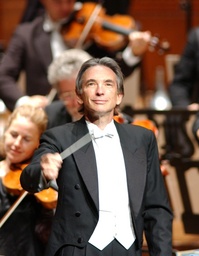San Francisco Symphony takes audiences on a remarkable tour of 'American Mavericks'
The weather has been balmy here in Ann Arbor. But a weekend’s worth of American Mavericks concerts by the San Francisco Symphony, in town courtesy of the University Musical Society, delivered a bracing Bay Area dose of Left-Coast, right-brain thinking to audiences at Hill and Rackham auditoriums Friday through Sunday.
Like the repertoire at Thursday’s opening “Mavericks” concert, the fare in the concluding three was extraordinarily well played and refreshing, engaging and challenging—sometimes all at once, sometimes in turn. If the concerts “proved” anything, it was that currentness or antiquity were not always the best clues to accessibility for a modern audience. In other words, once a maverick, perhaps always so? Age hasn’t gentled the corners on some of the 20th century pieces presented.

Michael Tilson Thomas publicity photo
For example, he likened Morton Feldman’s 1975 “Piano and Orchestra,” played on Saturday’s Hill Auditorium program, to a color-field painting. The analogy was tremendously helpful; it made the work, and the performance by a highly timbre-sensitive soloist, the pianist Emanuel Ax, snap into focus. It showed us where to “look,” or rather how to listen, alert to silences (our own and the musicians’), attuned to shimmering dissonances and to echoes and vibrations of pianistic color in the orchestra’s responses.
With Henry Brant’s orchestration of Ives’ monumental “Concord Sonata” on the program, Saturday was a Big Night for piano fans, even when the piano was not center stage. It was fascinating to hear this iconic piano sonata cloaked in orchestral colors, to hear its brassy marches played by brass, its hymns intoned by wind choirs, its Beethoven mottos hammered out by the percussion. Hawthorne and the Alcotts—the second and third movements—seemed the happiest translations. Somehow, the work was more easily parsed here—for better and worse. But it was great to rehear the Concord a la Brant—and then to spend part of the next day going back to listen to the piano original.
Friday’s concert was not subject to any such comparative listening. It was a sui generis affair, commencing with selections from the very Dadaist John Cage “Song Books,” staged by director Yuval Sharon. The all-star cast included conductor MTT—who proved he can operate a mean blender and smack his lips over the smoothie concocted therein—and three singers whose orbits might never otherwise cross: Joan La Barbara, Meredith Monk and Jessye Norman. Intersect (and overlap) they did on the Hill stage, however, in a setting that suggested Bedlam, only with more musical (and more charming) people.
They and their fellow performers sang (though the words were mostly unintelligible), distributed presents to audience members (Miss La Barbara), typed (Miss Norman), paced, blended, and spelled out MARCEL DUCHAMP, letter by letter. It was fun, in a theater-of-the-absurd kind of way, for about 20 minutes. The remaining 10 were … well, remaining.
And then came an intermission—50 minutes, at least, while the set (by Daniel Hubp) was dismantled. Coffee and cake in the lobby would have been nice, or just coffee—the rest of the concert, the orchestral portion, didn’t commence till 9:30 and the concert lasted till 10:45 p.m. (In San Francisco, the Cage was part of what appeared to be a shorter program; it’s not clear how to program the songs, staged, without a big break for a set change and orchestra set up.)
Luckily, what was up at 9:30 p.m., Henry Cowell’s “Synchrony,” began with a sinuous, stunningly shaded extended trumpet solo (by trumpet principal Mark Inouye), to rekindle tired minds. And the work that followed, John Adams’ new “Absolute Jest,” a toccata-like concerto grosso for string quartet (the St. Lawrence Quartet) and orchestra, had enough caffeinated energy to reawaken a whole hall-full of boggy listeners. It was remarkable.
Still, with Varese’s “Ameriques” to close the program, it was a long show.
Even without a lengthy intermission, Sunday’s chamber-music Mavericks concert, at Rackham Auditorium, also was on track to go into overtime, with a first half that lasted an hour and 20 minutes, and two substantial works in the second half. I couldn’t stay for the entire bill, but my memory card was getting so full after four maverick-filled days that paying close attention to the thorny works that opened the show—Del Tredici’s “Syzygy” and Lukas Foss’s “Echoi”—was about all I could manage.
In “Syzygy,” setting two poems of James Joyce, Del Tredici uses voice instrumentally, and what an expressive instrument the San Franciscans had in soprano Kiera Duffy, dipping and soaring, needling her way from low to high and back down again and piercing the ether with silvery sound. Nicole Cash was her mellow foil as french horn soloist.
Duffy made musical gestures count in “Syzygy,” and that was precisely what stood out as well in the Foss “Echoi,” where the very lucid performers were pianist Jeremy Denk, percussionist Jack Van Geem, clarinetist Carey Bell and cellist Peter Wyrick.

